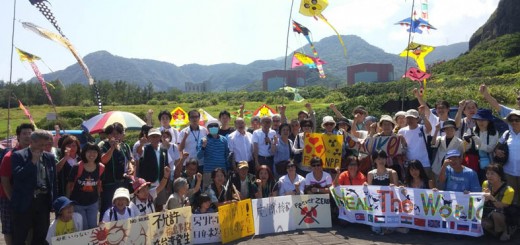Please sign! Petition demanding a review of nuclear fuel cycle policy and a freeze on the operation of Rokkasho reprocessing plant
Please add your signature to the petition below by sending your name and affiliation to Citizens’ Nuclear Information Center contact@cnic.jp by June 8th 2020
To be submitted to Kajiyama Hiroshi, Minister of Economy, Trade and Industry
Organizing Groups: Citizens’ Nuclear Information Center, FoE Japan, Iwate Committee to Protect the Sanriku Sea from Radiation, Peace Boat, Stop The Monju, Tokyo Citizens Against Reprocessing, 10,000 Plaintiffs Against the Nuclear Fuel Cycle
PETITION TEXT:
On May 13, 2020, the Nuclear Regulation Authority (NRA) approved the “Draft Review” that considers the Japan Nuclear Fuel Ltd. (JNFL) Rokkasho Nuclear Fuel Reprocessing Facility located in Rokkasho Village, Aomori Prefecture, to be compliant with the new regulatory standards.
JNFL is aiming to complete the plant in fiscal 2021 and this approval means it has overcome a major obstacle to this goal.
The Rokkasho Reprocessing Plant is a key component of Japan’s nuclear fuel cycle policy, and once it is operational, it can process up to 800 tons of spent fuel per year and separate 7 to 8 tons of plutonium.
However, reprocessing of spent fuel poses major problems for Japan and the international community, as described below.
- The international community is deeply concerned about Japan’s 46-ton plutonium stockpile and the planned operation of the Rokkasho reprocessing plant. The Rokkasho reprocessing plant and the plutonium stockpile are proliferation threats that will increase tensions in the region. Even if the safeguards were fully implemented, the accountancy capability would still be well in excess of significant quantity, considering the amount of plutonium required to produce a single nuclear explosive device is approximately 8 kg. Nuclear terrorism is also a real threat because the plutonium is vulnerable to theft. Japan’s nuclear fuel cycle policy has an undeniable impact on the international community and the Northeast Asian region.
- The total project cost of the Rokkasho reprocessing plant is 13.9 trillion yen, but the Japanese government is planning to build a second plant to manufacture the extracted plutonium into fuel. If the cost of this facility is included, the total cost of the nuclear fuel cycle project is more than 30 trillion yen. This hugely costly project would only reduce the amount of uranium fuel used by about 10%.
- The level of radioactivity emitted from Rokkasho reprocessing plant would far exceed the level from an ordinary nuclear power plant. For example, tritium contained in the water stored at the Fukushima Daiichi nuclear power plant is at present a major issue. But the total amount of tritium which would be released into the ocean in one year by Rokkasho when it is in full operation, would be ten times the total amount of tritium released in one year by all of Japan’s 54 reactors that were in operation before the Fukushima Daiichi accident. The amount of krypton-85 and carbon-14 released would also be overwhelming. JNFL claims that by discharging the gas from a 150-meter-high exhaust tower and the liquid from an ocean discharge pipe about 3 kilometers offshore and 44 meters deep, radiation levels in the vicinity will diffuse sufficiently so that there will be no increase in radiation. However, as the Fukushima Daiichi accident clearly showed, diffusion simulations are based on assumptions upon assumptions and are often inaccurate.
- In the event of a serious accident, there is a risk that a large amount of radioactive materials will be released into the environment.
Based on these problems of the Rokkasho Reprocessing Plant, we call on the Japanese government to establish an independent committee with various stakeholders to comprehensively review the nuclear fuel cycle policy from the standpoint of regional and global security, economic efficiency, radioactive materials released to the environment, and already existing methods of plutonium disposal.
As Japan’s plutonium stockpile is already 46 tons, we also call for the Japanese government to indefinitely postpone the operation of the Rokkasho reprocessing plant.

